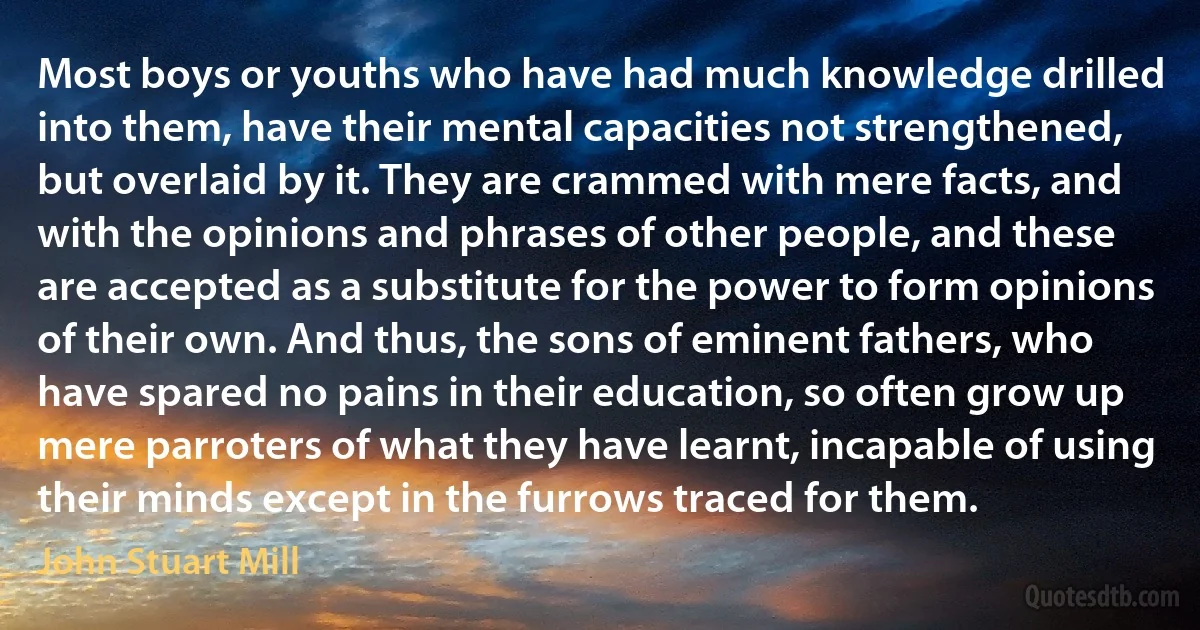Thus Quotes - page 55
In today's Britain, the idea that there could be a Constitution more powerful - and even sacrosanct - than any crowned head or elected politician (thus abolishing the false antithesis between hereditary monarchs and capricious presidents) is thought of as a breathtakingly new and daring idea.

Christopher Hitchens
Thus each successive epoch of theology found its own thoughts in Jesus; that was, indeed, the only way in which it could make Him live. But it was not only each epoch that found its reflection in Jesus; each individual created Him in accordance with his own character. There is no historical task which so reveals a man's true self as the writing of a Life of Jesus.

Albert Schweitzer
[A world-system is] a system that is a world and which can be, most often has been, located in an area less than the entire globe. World-systems analysis argues that the units of social reality within which we operate, whose rules constrain us, are for the most part such world-systems (other than the now extinct, small mini-systems that once existed on the earth). World-system analysis argues that there have been thus far only two varieties of world-systems: world-economies and world empires. A world-empire (examples, the Roman Empire, Han China) are large bureaucratic structures with a single political center and an axial division of labor, but multiple cultures. A world-economy is a large axial division of labor with multiple political centers and multiple cultures.

Immanuel Wallerstein
There is thus all the more reason to exercise extreme vigilance ... against anything that may lead the being to become "fused," or preferably and more accurately "confused" or even "dissolved," in a sort of "cosmic consciousness" that shuts out all "transcendence" and so also shuts out all effective spirituality. This is the ultimate consequence of all the anti-metaphysical errors known more especially in their philosophical aspect by such names as "pantheism," "immanentism," and "naturalism."

René Guénon
You know, my brothers, the nature of our business. The child you see before you, thanks to a talisman stolen from the powers of Earth, is able to take possession of the Blue Bird and thus to snatch from us the secret which we have kept since the origin of life... Now we know enough of Man to entertain no doubt as to the fate which he reserves for us once he is in possession of this secret. That is why it seems to me that any hesitation would be both foolish and criminal... It is a serious moment; the child must be done away with before it is too late...

Maurice Maeterlinck
The Esterhazy affair, thus, Mr. President, comes down to this: a guilty man is being passed off as innocent. For almost two months we have been following this nasty business hour by hour. I am being brief, for this is but the abridged version of a story whose sordid pages will some day be written out in full.

Émile Zola
I now saw, that a science is either deductive or experimental, according as, in the province it deals with, the effects of causes when conjoined, are or are not the sums of the effects which the same causes produce when separate. It followed that politics must be a deductive science. It thus appeared, that both Macaulay and my father were wrong; the one in assimilating the method of philosophising in politics to the purely experimental method of chemistry; while the other, though right in adopting a deductive method, had made a wrong selection of one, having taken as the type of deduction, not the appropriate process, that of the deductive branches of natural philosophy, but the inappropriate one of pure geometry, which, not being a science of causation at all, does not require or admit of any summing-up of effects.

John Stuart Mill
Most boys or youths who have had much knowledge drilled into them, have their mental capacities not strengthened, but over-laid by it. They are crammed with mere facts, and with the opinions or phrases of other people, and these are accepted as a substitute for the power to form opinions of their own: and thus the sons of eminent fathers, who have spared no pains in their education, so often grow up mere parroters of what they have learnt, incapable of using their minds except in the furrows traced for them. Mine, however, was not an education of cram. My father never permitted anything which I learnt to degenerate into a mere exercise of memory. He strove to make the understanding not only go along with every step of the teaching, but, if possible, precede it. Anything which could be found out by thinking I never was told, until I had exhausted my efforts to find it out for myself.

John Stuart Mill
You can have what you want- if you know how to form the mold for it in your own thoughts. There is no dream that may not come true, if you but learn to use the Creative Force working through you. The methods that work for one will work for all. The key to power lies in using what you have...freely, fully and thus opening wide your channels for more creative force to flow through you.

Robert Collier
There have been many complaints of people interested in the occult sciences that they had never got any chance at all to be initiated by a personal master or leader (guru). Therefore only people endowed with exceptional faculties, a poor preferred minority seemed to be able to gain this sublime knowledge. Thus a great many of serious seekers of the truth had to go through piles of books just to catch one pearl of it now and again. The one, however, who is earnestly interested in his progress and does not pursue this sacred wisdom from sheer curiosity or else is yearning to satisfy his own lust, will find the right leader to initiate him in this book. No incarnate adept, however high his rank may be, can give the disciple more for his start than the present book does. If both the honest trainee and the attentive reader will find in this book all they have been searching for in vain all the years, then the book has fulfilled its purpose completely.

Franz Bardon
The aim of Satanic power is to cut off communication with God. To accomplish this aim he deludes the soul with a sense of defeat, covers him with a thick cloud of darkness, depresses and oppresses the spirit, which in turn hinders prayer and leads to unbelief – thus destroying all power.

James O. Fraser
The first deterrence, nuclear deterrence, is presently being superseded by the second deterrence: a type of deterrence based on what I call 'the information bomb' associated with the new weaponry of information and communications technologies. Thus, in the very near future, and I stress this important point, it will no longer be war that is the continuation of politics by other means, it will be what I have dubbed 'the integral accident' that is the continuation of politics by other means.

Paul Virilio
[...] we can strip off all grammatical clues to sentence structure, all affixes and prepositions, and yet still achieve communication. Thus restricted to nouns, simple "stories" can be told in word chains: Woman, street, crowd, traffic, noise, haste, thief, bag, loss, scream, police.... Again, the reader's past experience of his language is sufficient to restore the missing elements, sufficiently accurately for the purpose. But of course, not only does the reader have experience of sentence structure, enabling him to supply the missing syntactical elements, but also he has experience of typical contexts in which the various words are used; many words bear an aura about with them. It might be more difficult to tell a tale about a policeman who robbed a woman, for instance, with so little redundancy!

Colin Cherry
If in our life and spiritual experience we have become accustomed to transcending our particular individuality, thus realising more clearly in our faith the universal and liberating value of this act, free from any objectivistic idolatry and if we centre down in our soul, in the reality of all things and all persons, then our meeting with death will be more serene, because already in our life we will have overcome the feeling of our limits as something terrible, insuperable and absolute. Absolute instead will be the act performed in the self, the celebration of God's presence.

Aldo Capitini



